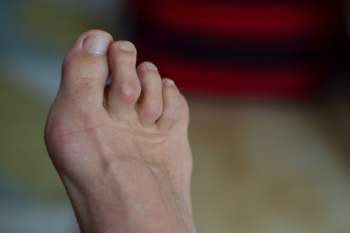Characteristics of Hammertoe
Tuesday, 11 June 2024 00:00
Hammertoe is a foot deformity characterized by an abnormal bending of the toe joints, causing the affected toes to resemble a hammer or claw. This condition typically affects the second, third, or fourth toes, although it can occur in any toe. Hammertoe often develops gradually over time, due to factors like ill-fitting shoes, foot structure abnormalities, or muscle imbalances. One of the noticeable features of hammertoe is the bending of the toe joints, resulting in a permanent, abnormal position that may cause pain, discomfort, or difficulty walking or wearing shoes. Other characteristic symptoms include corns or calluses forming on the tops of the affected toes due to friction and pressure from rubbing against footwear. Additionally, individuals with hammertoe may experience limited range of motion in the affected toes, making it challenging to straighten or flex them fully. If you notice a deformity in your toes, it is suggested that you make an appointment with a podiatrist for an exam, a diagnosis and the appropriate treatment.
Hammertoes can be a painful condition to live with. For more information, contact Dr. Michael A. Wood of Foot Health Institute. Our doctor will answer any of your foot- and ankle-related questions.
Hammertoe
Hammertoe is a foot deformity that occurs due to an imbalance in the muscles, tendons, or ligaments that normally hold the toe straight. It can be caused by the type of shoes you wear, your foot structure, trauma, and certain disease processes.
Symptoms
- Painful and/or difficult toe movement
- Swelling
- Joint stiffness
- Calluses/Corns
- Physical deformity
Risk Factors
- Age – The risk of hammertoe increases with age
- Sex – Women are more likely to have hammertoe compared to men
- Toe Length – You are more likely to develop hammertoe if your second toe is longer than your big toe
- Certain Diseases – Arthritis and diabetes may make you more likely to develop hammertoe
Treatment
If you have hammertoe, you should change into a more comfortable shoe that provides enough room for your toes. Exercises such as picking up marbles may strengthen and stretch your toe muscles. Nevertheless, it is important to seek assistance from a podiatrist in order to determine the severity of your hammertoe and see which treatment option will work best for you.
If you have any questions, please feel free to contact one of our offices located in Lansing, and Chicago, IL . We offer the newest diagnostic and treatment technologies for all your foot care needs.




